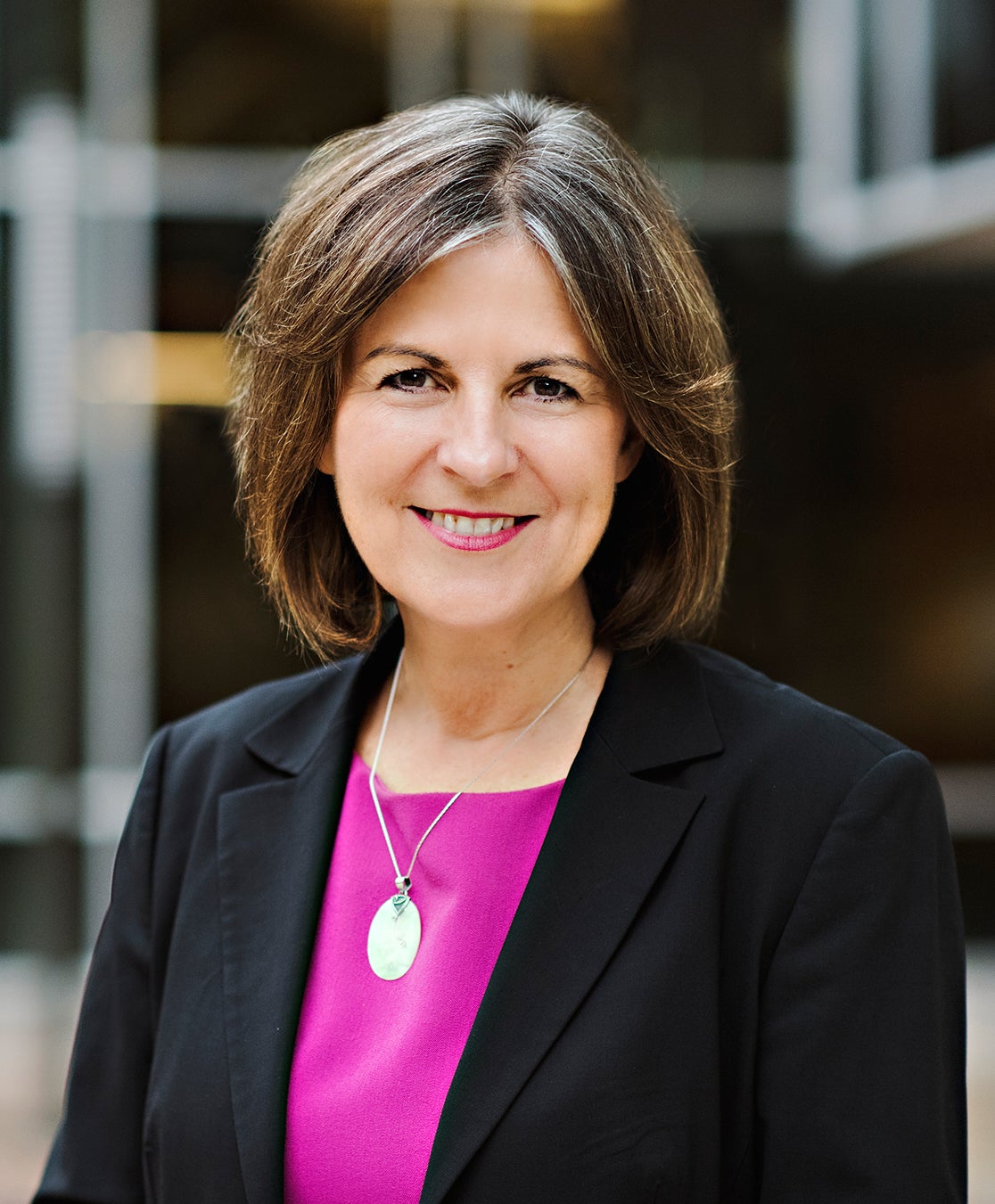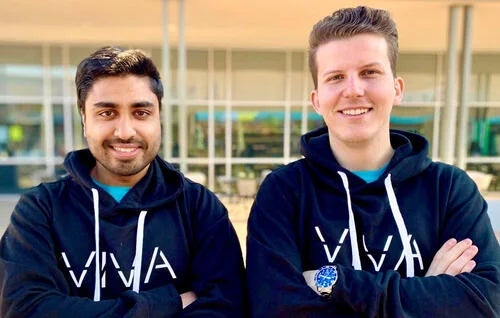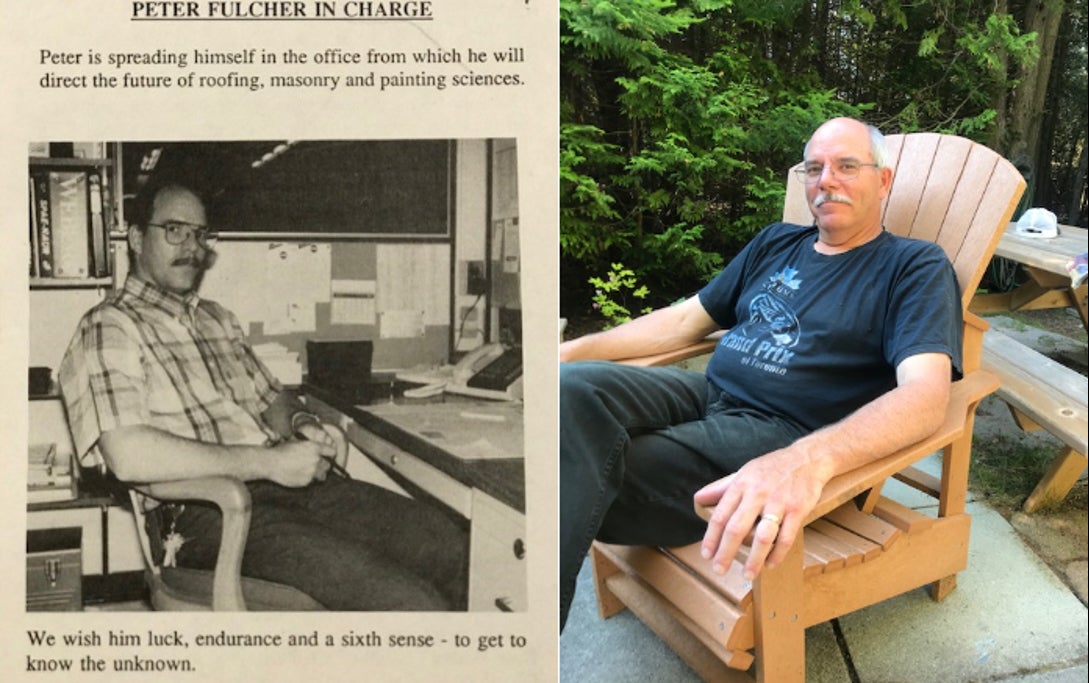Editor:
Brandon Sweet
University Communications
bulletin@uwaterloo.ca
Vice President of Advancement Joanne Shoveller to retire this year

Joanne Shoveller, Vice President, Advancement, will retire from the University of Waterloo at the end of the year, completing her five-year term on December 31, 2021.
"It is with sadness that I’m letting you know that Joanne Shoveller has informed me of her decision to retire from the University," writes President Feridun Hamdullahpur in a memo circulated to employees this week.
"Due to personal circumstances, Joanne wants more flexibility to spend time with her family and pursue new professional interests."
"I am extremely grateful for the work Joanne has done and will continue to do during her tenure at Waterloo," the president continues. "We will miss her unwavering style of empathetic and passionate leadership. I am encouraged that Joanne’s remaining 10-month transition plan will allow us to continue to build on the work she and her team have started. She will continue building very inspiring fundraising and engagement opportunities ahead for the University."
“My priority, to position our university and its leadership for the strongest possible years ahead, will remain at the heart of my work through the end of this year,” reads a statement from Shoveller.
Mike Stork, chair of the University’s Campaign Operating Board, shared the following tribute:
“I’m so proud to have worked alongside Joanne as we build the foundations to approach donors who will support Waterloo’s dreams and priorities. Joanne has been tireless in her efforts to support everything this University wants to be. I look forward to an exciting 10 months working with her and in preparing for the next leader of our Advancement strategy and team.”
In his memo, the president notes that the University’s senior leadership will continue to support the entire Advancement team over the remainder of 2021.
The University celebrates International Women's Day
Yesterday was International Women’s Day, honouring the importance of equity, women's achievements, accelerated gender parity and much more. This year, Waterloo celebrated the day virtually, with close to 600 people in attendance.
In case you missed it, you can view a recording of the celebration below or on Waterloo's YouTube page. Ziya Tong moderated an exceptional discussion, with special remarks from Angela Saini, Dr. Janét Aizenstros, and Trishala Pillai (BA ’16, economics).
To keep the spirit of International Women's Day going, take a moment this week to share a tribute to a female who inspires you on the celebration board.
HREI review panel provides update, seeks feedback
A message from the External Review Team - Human Rights, Equity and Inclusion Review.
We are underway with the Human Rights, Equity, and Inclusion (HREI) organizational review and wanted to share an update with you on our progress to date.
As outlined in our December 18, 2020 memorandum, the review panel started by interviewing members of the HREI team before the winter break and finished these interviews in mid-January. We have also been working with Michelle Hollis, director, human resources (HR) client services, to organize and schedule the various requests for, and invitations to, meetings with members of the University of Waterloo community. Currently, there are approximately 40 such meetings scheduled. We also expect to have three separate roundtables with students, faculty, and staff. Given the demands upon people’s time, we understand that the meetings will be scheduled between now and early April. We plan to provide the University with a report to be shared with the community by the end of May 2021.
We have also worked with the University to develop a website dedicated to the review, which can be found on the HREI website: https://uwaterloo.ca/human-rights-equity-inclusion-dept-review/. The site provides a link to a communication form or an email address (hrei.review@uwaterloo.ca) for written submissions or requests to meet with the review panel. We welcome you sharing your thoughts, observations, and experiences with us. Only members of the Review Panel will be reviewing these forms and monitoring this email.
As stated in our December 18 memorandum, our deliberations will be confidential. By this we mean that there will be no attribution of what was said to us in any meeting or written submission. Our report will be organized thematically, and where examples are used, we will ensure the confidentiality of the individuals sharing them.
We are looking forward to meeting with members of the University of Waterloo community and to the conversations we will have in this review process. We wish to extend our gratitude in advance for your willingness to participate and contribute to the review process and in the future of the HREI department.
Leveraging the untapped talent of women in Latin America

By Alyana Versolatto. This article was originally published on Waterloo News.
Two ambitious School of Accounting and Finance (SAF) alumni were bold enough to start a venture amid a tumultuous global economic environment.

Adnan Khan (MAcc ’17) and Fineas Tatar (BAFM ’20) who once called each other classmates and roommates, are now co-founders of a social impact startup named Viva. Launched last year, their startup matches executives at high-growth companies in North America with talented virtual analysts (VAs) in Latin America (LatAm) to perform tasks such as calendar management, lead generation, content creation, research, data analysis and more.
“When we started Viva, we immediately got in touch with our long-standing mentors and fellow University of Waterloo alumni, Upkar Arora and Steve Balaban, who have served as invaluable advisors,” says Khan, co-founder of Viva.
The AFM graduates were driven to solve the problem of lost productivity within companies by tapping into an underutilized network of LatAm talent. They were inspired by Muhammad Yunus, the 2016 Nobel Peace Prize winner who founded the microfinance organization Grameen Bank, which empowers women in Bangladesh to start businesses with microloans. Similarly, their startup Viva focuses on providing employment opportunities to women in emerging economies. The startup’s mission of increasing the participation of women in the workforce tackles the United Nations Sustainable Development Goal (SDG) 5, which is to achieve gender equality and to empower all women and girls.
It was co-founder Khan’s experience with Deloitte Consulting and EduGate that exposed him to the unique challenges faced by the labour force in LatAm — particularly women who are often held back in their careers due to a lack of meaningful job opportunities.
“Through my work in Latin America with multiple education-focused not-for-profit organizations, I saw firsthand the challenges students face when entering an education system that leads to limited employment opportunities. When there is no light at the end of the tunnel, why enter the tunnel in the first place? Current circumstances have exacerbated this situation, particularly for women in Latin America, where employment has fallen disproportionately more for women than for men. If we don’t take action now, the gender gap for economic participation will further widen,” Khan says.
Former work turned future opportunity
While co-founder Tatar drew upon his experience with UberEats and several startups, where he learned how to effectively onboard, train and mobilize global talent through a hands-on playbook methodology, he also brought a wealth of knowledge on leading productivity tools and how to leverage them.
"Through corporate roles, we’ve both worked with executives at startups and large enterprises. The recurring theme that we’ve seen is that executives are overloaded with non-executive-level work. If we can give these executives some of their time back while increasing their output, we will have solved a large, oftentimes invisible problem," says Tatar, co-founder of Viva.
The employment opportunity that Viva provides comes at a stressful time for women in Latin America, as the pandemic has only worsened their career prospects with job insecurity and lay-offs affecting more women than men. According to the Center for Strategic and International Studies (CSIS), Latin America’s economy took an especially hard hit from the pandemic compared to the other emerging markets of Asia, Eastern Europe, the Middle East, and Africa. The 2021 economic recovery is also expected to be relatively weak, which will further widen the income gaps across regions.
On the flip side, the pandemic also delivers an opportunity to rethink the traditional ways of working. Remote work done by Viva’s virtual analysts is now much more common and preferred, which can assist women to improve their circumstances. As outlined by UN Women: “Enabling women’s potential fully and equally with men promotes sustainable, balanced, inclusive growth, improves the representation of women within institutions and intergenerational development outcomes, and is also thus crisis-cushioning.”
To recruit talent, the Viva team draws upon the deep relationships they have built with communities in several countries including Nicaragua, Venezuela, Guatemala, Argentina and Ecuador. The team then screens through the hundreds of applicants for virtual analyst roles. Successful applicants are hired and trained through a robust eight-week training program so they can hit the ground running with a matched client from day one.
“Being a virtual analyst at Viva represents a great opportunity for women in Latin America like me,” says Marisol, a current virtual analyst at Viva. “It has helped me develop my skills through constant training and feedback. Collaborating with teammates from different countries has also been a unique learning experience. I’m passionate about helping clients and giving them back valuable time while helping them grow their business. I look forward to my continued career growth with Viva.”
And so far, their clients are reporting an increase in productivity — with some claiming that since they have hired a Viva virtual analyst, they have saved three hours per workday and their overall output has increased.
“Our mission is to be the leading virtual analyst service, providing an unrivalled experience for our clients, colleagues and communities,” Tatar says. “Our client impact and social impact are interdependent — we aspire to continue to push both of these agendas forward in 2021.”
Peter Fulcher to retire after 36 years

A message from Plant Operations.
Plant Operations would like to announce that Peter Fulcher is retiring after more than 36 years of service at the University. Peter has displayed technical knowledge, leadership, and incredible endurance dealing with the daily challenges of supervising the Building Services team in Plant Operations.
Peter began his journey with the University in 1984 as a Carpenter. In the past three decades, he took on the role of a foreperson and later a supervisor of Roofing, Masonry and Painting services. During his long service, Peter has seen significant campus expansion, enrollment growth, stunning new buildings, but also growing aches of aging campus.
Peter’s friendly and helpful approach has been very much appreciated by his colleagues as well as many faculty and researchers. His smile and support will be missed by many in our campus community.
We are sad to see Peter leave, but wish him all the best in his retirement and many happy years to spend with his family, teaching his grandkids to fish, or just enjoying the peace and quiet being out on a lake.
Please join us in thanking Peter for his years of service to the institution and Plant Operations.
Tuesday's notes
"The Winter 2021 Instructors Survey is being extended until Friday, March 12th," reads a note from Institutional Analysis and Planning (IAP). "We encourage you to participate if you have not already done so. We carried out a similar survey in Spring 2020, and made extensive use of the results to better support remote instruction in subsequent terms. Results of the current survey will be useful for our continuing efforts to provide supports to instructors teaching remotely, and will also help us when we return to campus since online teaching is likely to be a larger part of what many of us choose in our courses in the future."
To participate, visit the Winter 2021 Instructors Survey website and follow the survey link near the bottom of the page. You will need to log in with your WatIam credentials to access the site. However, your login information will not be linked to your survey response.
This survey should take about 10-15 minutes and will be available until March 12th.
Participation in this survey is voluntary and you may decline to answer any questions or withdraw from the survey at any time without affecting your relationship with the University. Your answers will be kept confidential. This survey does not ask for any personally identifying information. Any reports of this survey will include only summarized results, ensuring that no individual can be identified.
Here's the latest Nutrition Month "Myth vs. Fact" supplied by Health Services Dietitian Sandra Ace:
Myth: Farmed salmon isn’t as healthy as wild salmon and should be avoided.
Fact: Both types of salmon are similar nutritionally, however their environmental impacts differ.
Salmon is the most commonly consumed fish in Canada and health experts have long sung it’s praises because it is a rich source of omega-3 fatty acids. These essential fats play an important role in good health, including protection against heart disease. Most salmon sold in Canada is Atlantic salmon, a farm-raised fish which is less expensive than the wild caught variety, but which has come under tremendous fire from environmental groups. At the risk of oversimplifying these complex and contentious issues, I’ll focus on health benefits and will provide further links so you can make your own decisions around environmental issues.
Nutritionally, farmed salmon and wild salmon are very similar: both are excellent sources of protein, vitamin D and omega-3 fats. In fact, farmed salmon is slightly higher in omega-3s because it is fattier than wild caught salmon. Both are low in mercury but the industrially-produced fish meal fed to farmed salmon means it contains higher levels of environmental contaminants like PCBs and pesticides. Health Canada maintains that the level of PCBs found in both farmed and wild salmon is safe and does not pose a health risk. Most health experts agree that the health benefits of eating both varieties of fish far outweigh any risks from PCB or other chemical exposures.
The environmental concern centers on how farmed salmon are raised – often in crowded pens near ocean shores, causing pollution along the shoreline that poses a danger to fish and aquatic plants. Salmon farming, rather than preserving ocean fishery stocks, may instead harm wild salmon and other sea life because of the potential for spreading diseases such as sea lice as well as cross breeding. You can learn more how to make environmentally sustainable seafood choices through public awareness programs such as SeaChoice.org, a coalition of Canadian conservation organizations or Ocean Wise, a British Columbia-based conservation organization that has a searchable sustainable seafood list.
The bottom line? Eat a variety of seafood. If you enjoy salmon frequently, choose wild caught if you can find it and afford to buy it. Farmed catfish and trout are also healthy choices and have less environmental impact. Canned wild salmon is also a versatile, affordable and sustainable option.
Link of the day
30 years ago: R.E.M.'s Losing My Religion
When and Where to get support
Students can visit the Student Success Office online for supports including academic development, international student resources, leadership development, exchange and study abroad, and opportunities to get involved.
Instructors can visit the Keep Learning website to get support on adapting their teaching and learning plans for an online environment.
Updated Course templates are now available within your course in LEARN to help you build and edit your content and assignment pages quickly. Support for Winter 2021 is available.
The following workshops, webinars, and events are offered by the KL team (CTE, CEL, ITMS, LIB):
Independent Remote Course Design Essentials. Self-directed, continuous self-enrollment course in LEARN.
NEW - PebblePad Users Group (CTE7526), Wednesday, March 24, 2:00 p.m. to 3:30 p.m.
Employees can access resources to help them work remotely, including managing University records and privacy of personal information. Here are some tips for staying healthy while working from home.
Stay informed about COVID cases on campus by consulting the COVID case tracker.
Whether you’re a student or faculty member, the Writing and Communication Centrehas virtual services and programs to help you with all of your academic writing needs. This term we have added evening and weekend one-to-one appointments with our peer tutors, and our NEW one-to-one workshops, where you can learn the content directly from one of our writing advisors.
- Undergraduates: Work with us to brainstorm, draft, revise, and polish your assignments in one-to-one appointments. Ask questions and learn writing tips at our Instagram Live Q&A sessions, and beat isolation while improving your writing skills at the weekly PJ-friendly writing groups.
- Graduates: Meet with our advisors in one-to-one appointments. Join the online writing community at the Virtual Writing Cafés, learn how to present your work at Speak Like a Scholar, or get moving on your dissertation at Dissertation Boot Camp.
- Faculty and Instructors: Request custom workshops for your courses, join the Waterloo writing community at the Virtual Writing Cafés, or make progress on your article, book, or chapter in one-to-one meetings with our faculty specialist.
Co-op students can get help finding a job and find supports to successfully work remotely, develop new skills, access wellness and career information, and contact a co-op or career advisor.
The Centre for Career Action assists undergraduates, graduate students, postdocs, staff, faculty, and alumni through navigating career services that are right for them. You can attend a one-on-one appointment or same day drop-in session at the CCA for assistance with cover letter writing, career planning and much more. You can also book an appointment online or visit our Live Chat to connect with our Client Support Team. The CCA is here to help you.
If you feel overwhelmed or anxious and need to talk to somebody, please contact the University’s Campus Wellness services, either Health Services or Counselling Services. You can also contact the University's Centre for Mental Health Research and Treatment. Good2Talk is a post-secondary student helpline available to all students.
The Library has published a resource guide on how to avoid information overload.
The Faculty Association of the University of Waterloo (FAUW) continues to advocate for its members. Check out the FAUW blog for more information.
The University of Waterloo Staff Association (UWSA) continues to advocate for its members. Check out the UWSA blog for more information.
The Indigenous Initiatives Office is a central hub that provides guidance, support, and resources to all Indigenous and non-Indigenous campus community members and oversees the university Indigenization strategy.
The Waterloo Indigenous Student Centre, based at St. Paul’s University College, provides support and resources for Indigenous students, and educational outreach programs for the broader community, including lectures, and events.
WUSA supports for students:
Peer support (Visit https://wusa.ca/peersupport to book an appointment):
- MATES – Available Monday to Friday, 10:30 a.m. to 9:30 p.m.; Saturday and Sunday, 10:30 a.m. to 5:30 p.m. (online only)
- Support sessions available in the following languages: Cantonese, English, Hindi, Mandarin, Portuguese, Punjabi, Spanish, and Urdu.
- Glow Centre – Available Monday to Friday, 4:00 p.m. to 8:00 p.m. (online only)
- RAISE – Available Monday to Friday – Varied hours (online only)
- Women’s Centre – Available Monday to Friday, 2:00 p.m. to 5:00 p.m. (online only)
Bike Centre – Will be reopening soon.
Campus Response Team, ICSN, Off Campus Community and Co-op Connection all available online. Check https://wusa.ca for more details.
Food Support Service food hampers are currently available from the Turnkey Desk on weekdays from 7:30 a.m. to 7:00 p.m. in the Student Life Centre. If you have any questions please email us at foodsupport@wusa.ca.
Centre for Academic Policy Support - CAPS is here to assist Waterloo undergraduates throughout their experience in navigating academic policy in the instances of filing petitions, grievances and appeals. Please contact them at caps@wusa.ca. More information is available.
WUSA Commissioners who can help in a variety of areas that students may be experiencing during this time:
- Equity – equity@wusa.ca
- Co-op and Experiential Affairs – coop.affairs@wusa.ca
WUSA Student Legal Protection Program- Seeking legal counsel can be intimidating, especially if it’s your first time facing a legal issue. The legal assistance helpline provides quick access to legal advice in any area of law, including criminal. Just call 1-833-202-4571.
Empower Me is a confidential mental health and wellness service that connects students with qualified counsellors 24/7. They can be reached at 1-833-628-5589.
When and Where (but mostly when)
Healthy Warriors at Home. Free programming including Online Fitness, Health Webinars, Personalized Nutrition and more from Warriors Athletics and Rec. Open to students, staff, faculty and alumni. Register today.
Livestream Exercises for Waterloo staff: Join us for an energy boosting Bootcamp or a fast and effective Express Home Workout! Open to UW Staff and subsidized by the Staff Excellence Fund.
Renison English Language Institute continues to offer virtual events and workshops to help students practice their English language skills.
Warriors vs. Laurier Blood Donation Battle. Join your fellow Warriors, donate blood and help us win the Blood Battle against Laurier for a second year in a row. Set up a profile or add the PFL code: UNIV960995 to your account if you have a blood.ca account already. Questions? Contact WarriorsInfo@uwaterloo.ca.
Warrior Rec Free Programs for Students, January to February.Wide range of free opportunities available to keep students active and healthy including: Fitness Classes (On-Demand), Health and Mindfulness Webinars, Personalized Nutrition Guides, Personal Training Consultations, Small Group Training and Warrior Reset. Register today.
Drop-in to Warrior Virtual Study Halls on Wednesdays from 5:30 p.m. to 7:00 p.m. Come together in this virtual space to set goals and work independently or in groups each week.
FAUW service opportunities, Tuesday, March 9, 1:30 p.m. to 2:30 p.m.
Noon Hour Concert: To tell a love story, Wednesday, March 10, 12:30 p.m.
Concept $5K Semi-Finals - Night 1, Wednesday, March 10, 5:00 p.m., virtual event
Concept $5K Semi-Finals - Night 2, Thursday March 11, 5:00 p.m., virtual event
NEW - Master of Taxation Virtual Information Session, Friday, March 12, 2:00 p.m. to 3:00 p.m. To register, visit www.mtax.ca.
FAUW Indigenization Reading Circle, Friday, March 12, 11:00 a.m to 12:00 p.m.
NEW - Master of Taxation, Virtual Information Session, Saturday, March 13, 9:00 a.m. to 10:00 a.m. To register, visit www.mtax.ca.